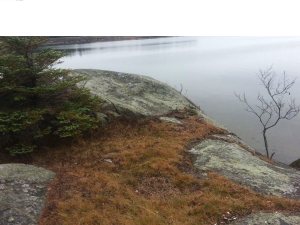Editors’ Note: This article is part of the Public Square 2014 Summer Series: Conversations on Religious Trends. Read other perspectives from the Pagan community here.
The greatest conflict between most thoughtful Pagans and modern society is our relationship with the other-than-human world. The reason is simple.
Modern society limits the moral universe to other human beings. A tiny fringe suggests expanding moral standing to include the “right kinds” of animals. Everything else is a tool for human exploitation, a problem, or irrelevant. This attitude is exemplified by ‘free market environmentalists’ claiming buffalo wandering beyond Yellowstone National Park constitute “pollution” (p. 27). But it is also present when people argue we need to preserve “our resources” for future generations.
In my view a coherent Pagan outlook asserts the other-than-human is also the more-than-human. The natural world is not composed simply of resources or what is irrelevant or a problem. We live within a meaningful world of subjects not a meaningless world of objects. We exist within networks of relationships possessing ethical dimensions. So far as we know this view has characterized Pagan belief and much practice since the rise of hunting and gathering societies.
This does not mean Pagan societies always dealt with nature appropriately any more than Americans live up to the principles of our Declaration of Independence or Christians live up to the teachings of Jesus. Pagans are as subject to corruption by power and greed as anyone else. But like our Declaration and the best Christian traditions, these principles provide a perpetual critique to the corrupt and a perpetual pressure for decent people to do better. They matter.
Today’s economic institutions are incapable of preserving the relationships that make sustainable human life as rich and meaningful as it can be. Indeed they threaten life as we know it. Traditional monotheistic religious teachings and secular reason are proving too weak to reverse this trend.
Pagan insights alone will not solve this problem, but they can help us better understand it and the need for major changes. Pagan sensibilities if not beliefs about Nature are what this society needs to flourish into the next century.
Ethics checks power. Our society has no ethic of respect towards the other-than-human and vastly more power to destroy than earlier ones. We need a modern ethic of respect and restraint, and Pagan religion can be a powerful contributor to this process. Many of these insights are implicit but neglected in Western religions, and as we helped inspire (162-72). Christians, Buddhists, and Jews to explore the feminine side of their religion, so hopefully we can do the same with regard to this world.But by itself that is not enough.
The central tension
The central tension between human society and the rest of nature is easy to describe and hard to resolve. In the short run, human power is strongest, but nature always bats last and always hits homers. If we ignore this truth we will always lose in the long run. And our long run is someone else’s short run. That is the problem.
My grandparents were born when horses were still a common mode of transportation. Most died after men landed on the moon. Current generations are experiencing changes in technologies of communication and information storage and access that if not quite as spectacular, are every bit as profound. The human world changes as our ideas change.
By contrast Nature adapts through genetic modification over generations. Bacteria, most insects, mice, rats, and many ‘weeds’ handle human society pretty effectively because they reproduce rapidly. Everyone else is at a disadvantage, including much of what we love most about the living world.
Our ancestors’ long run has become our and our children’s short run. Nature is coming to bat and the bases are loaded. Global warming is the most important single issue, but the over-fishing of the oceans, the destruction of genetic diversity in our agriculture, the obsolescence of our antibiotics due to their use in factory farms, the poisoning of large areas of the world by petroleum accidents, the draining of water needed to nourish ecosystems and humans alike, the endless disaster of Fukushima, and the rapid decline of animals important to us both economically and in enriching the quality of our lives, like bees and monarch butterflies. This list is not exhaustive.
All these problems arise from amoral modern institutions acting in immoral ways. And that is our second big problem.
Corporate sociopathy
Ethics is in the realm of individual choice and responsibility, and also of individuals deciding together to enforce certain values as a community. For example, our commitment to education for all is a public value, and constitutes an expression of public values. Despite the best efforts of economists and corporations, we still have a sense of public values in this country. But there is a contradiction at the core of modern society.
Their internal structure as well as the market order within which they operate makes it impossible for ethics to matter when they get in the way of corporate profit. Like any of us, a great entrepreneur is a complex individual and will be motivated by many values of which money is not necessarily most important. The corporations they establish while realizing their dreams are different.
If a corporate CEO turned down a chance to increase profit due to moral qualms he would be legally in violation of his “fiduciary duty” to shareholders. He would also be subject to being ousted in a corporate takeover by more ruthless executives. When ethics gets in the way of making money, corporations will abandon ethics.
There is an clear and inspiring example of this truth from our own recent history.
During “Redwood Summer” Pagan ethics and corporate amorality clashed. Powerfully. Pacific Lumber was a sustainable and profitable family owned firm that went public to raise more money. Their shares were lower than they would have been if the company operated unsustainably, cutting as much as they could. It was seized by corporate raiders who began destroying the land to increase profits. Pagans in Reclaiming and Starhawk played a major role in the ultimate defeat of this corporation, saving enormous expanses of forests, streams, and rivers. When Pacific Lumber was finally required to act sustainably they went bankrupt whereas before becoming a public corporation they had done so for generations.
Today joint stock corporations consistently override ethical principles most human beings observe and respect. Motivated by profit, corporations did all they could to retard the regulation of cigarettes, and even now seek to expand the market to children abroad. Corporations producing DDT fought hard to prevent DDT regulation, and viciously defame Rachel Carson in the process. (As they continue to do.) Corporations destroy the homes and lives of people who are politically powerless and stand in the way of their lust for profit, be it Indians in Latin America, Africans in Nigeria, or poor farmers in Pennsylvania. Or vulnerable people anywhere else in the world when there is a buck to be made.
The modern economic system systematically excludes all ethical considerations from its operating system. It is no accident that the biggest banks launder money for the most criminal cartels. Institutions unable to respect human values will never respect the more-than-human. These values impinge from the “outside” as “costs” and “government overreach.”
There are answers. Pre-industrial tribal peoples could also destroy their environment, and with it the basis for their prosperity. The wisest did not. For example, in the American West salmon were a prized trade good. Northwestern Indian peoples had the ability and short-term motives to extirpate salmon from the rivers and streams within their territories. But when Europeans arrived those waters were filled with fish.
Native peoples preserved salmon populations because they immersed their material economy within a ethical context of respect and ritual that preserved the fish from short-term greed. So far as we know this arrangement worked for thousands of years. Europeans had the logic of the market, an ethic that at best applied only between people. Within decades Europeans destroyed those populations.
A way out
We do not have to reject the modern world. We do have to bring the impersonal amorality of the market and its dominant institutions under human control.
Corporations do not enjoy injuring people. They do not care. Any corporate officer standing in the way of profit will be ousted or marginalized no matter what their reason, and any outsider who gets in the way will be sacrificed as cheaply as possible. An aristocrat of the past could be and in the best cases was motivated to serve humanity even if the society that gave them their privileges was corrupt. Corporations cannot do this unless it makes them money.
In the name of a more humane future for all, Pagans must do all we can to restrict the power and extent of joint stock corporations. Economic decisions must be made by human beings who will not be penalized if they do not put money profit first. This means removing joint stock corporations from sectors of the economy closely interacting with the natural environment.
A farmer can act ethically. So can a hunter, a fisherman, a logger, a rancher. Each does so in their own way, and being human, some will act in a more praiseworthy fashion than others. But except for sociopaths, all will act from within a deeper moral universe than can a joint stock corporation. And so corporations should be barred from agriculture, from logging, from fishing, from ranching, indeed from any interaction where ethical restraints that can lower profits are needed.
What to put in their place?
Then what?
We have plenty of examples.
Individual and family ownership are a time proven option. Most people are ethical and most others can be influenced by community values in a way impossible for a large corporation.
Land trusts ranging from the Trust for Public Land down to hundreds of state and local organizations are not driven by the profit motive over everything else, and so can balance the human and natural worlds. Many ranchers are selling conservation easements to such trusts, enabling them to continue ranching profitably while the land is preserved. The UK’s National Trust shows trusts are superior to both private industry and political control for preserving sustainable practices.
The difference between management by ethically shaped communities compared to national forests manipulated by corporations and politicians is remarkable. The Menominee Reservation in Wisconsin has healthier forest land than neighboring national forests, more trees, and more production of wood. It stands out even from space. Their forest is profitable for the tribe spiritually and culturally as well as monetarily.
Unless forms of economic organization able to incorporate ethical principles as effective limits to money-driven behavior can be established, all the fine principles in the world will not save us from disaster upon disaster as human power and corporate greed overrun the earth’s short term capacity to sustain healthy ecosystems.
Will this happen?
Who knows?
It may be so many Americans are in obstinate denial that only serious disasters will get their attention. When discussing our own spiritual growth many of us, I among them, describe the “2X4 school of enlightenment.” It may well be that America will need the same treatment.
If it comes to that we can be sure the 2X4 will be administered. As long as it takes.
Once their attention is gotten, Americans will need to have a sense of where to go, of what to do. We can play an important role here by continuing to act and teach that we live in a world of relationship and value, a world deserving love and demanding respect. And we can support people, organizations, and businesses that do as well.
Who knows? Maybe we can help change this place enough to avoid the 2X4.















